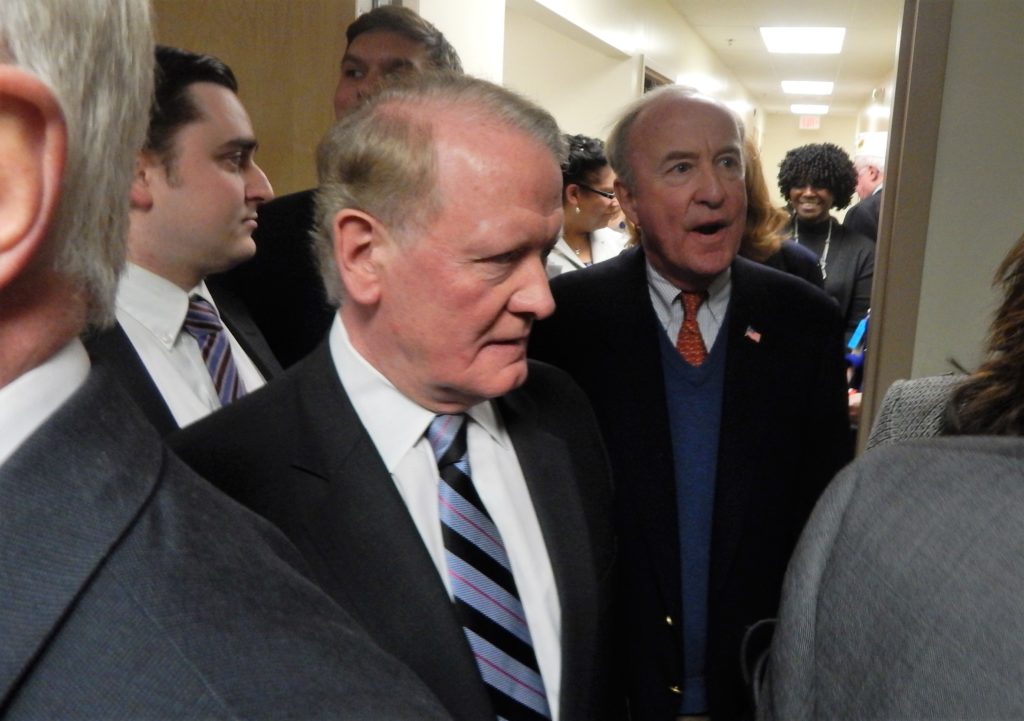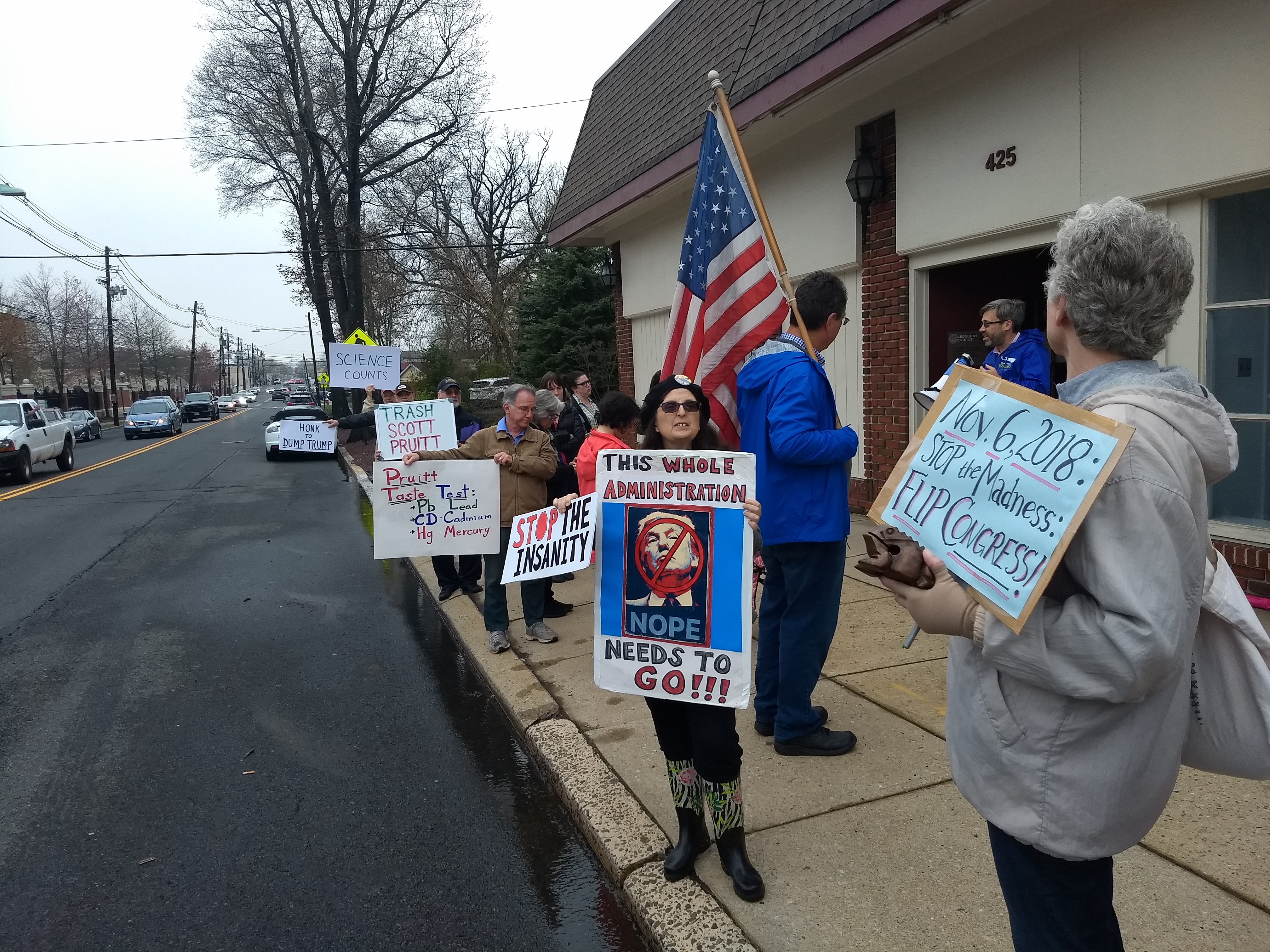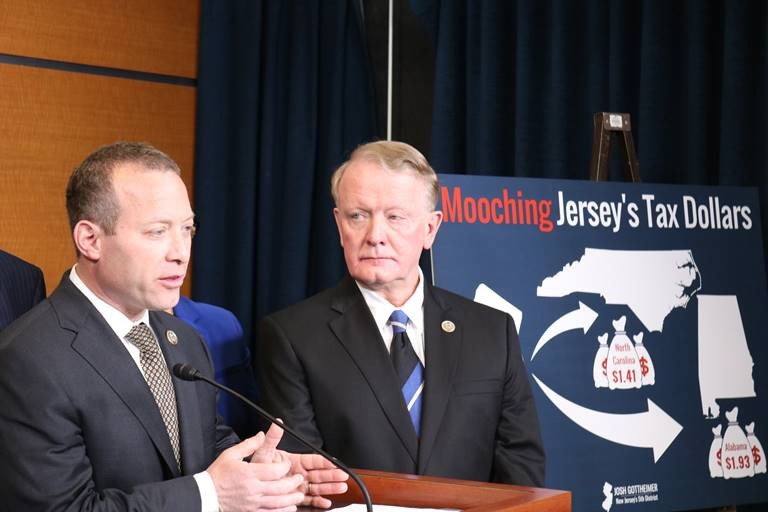Three Things to Consider in Leonard Lance’s Reelection Bid

As Donald Trump’s controversial presidency unfolds, Congressional races across the country are looking to be tough fights for Republicans this November.
New Jersey is no exception, where at least one – or even conceivably all, according to Monmouth University Pollster Patrick Murray – districts could flip from red to blue.
Longtime representatives Frank LoBiondo and Rodney Frelinghuysen, in the 2nd and 11th districts respectively, have bowed out of potentially tooth and nail Trump-encumbered fights to keep their seats.
But three Republican Congressman, Leonard Lance (CD-7), Tom MacArthur (CD-3) and Chris Smith (CD-4) have opted to ride out the storm.
What’s in store for them?
Lance, according to Murray, is the most likely of the three to face the toughest fight this November, when he runs against Rocky Hill-resident Tom Malinowski, a former assistant U.S. secretary of state during the Obama years.
“He’s in a district where the demographics line up with the kind of district that is prime to flip in the current environment,” Murray said. “It’s not a particularly strong Republican district, and the kind of Republican that lives in that district, include a significant number who have rejected Trump.”
The 7th district stretches from the sparsely populated and woodsey Hunterdon County on the Delaware River, all the way to the tightly packed urban centers near Port Elizabeth, representing 750,000 residents.
In 2016, Democratic presidential contender Hillary Clinton narrowly took the district by 3,800 votes, a percent point over Trump’s voter turnout.
That same year, Democrat Peter Jacob lost his bid for Congress by a much wider margin, 148,188 votes to Lance’s 185,850 votes.
But Lance, Murray suggested, “is the one who best understands what he’s up against,” and he’s up against a lot.
Malinowski, to his credit, is trailing just behind Lance when it comes to fundraising; $740K versus $850K cash on hand, respectively.
That’s as of March 31, according to federal fundraising records.
And so, the race could be a toss-up for who represents the 7th Congressional district. Here are three factors to consider.

1.) Lance? A flip-flopper?
As the November race picks up, there’s been speculation from opponents and political onlookers that Lance has adopted a “weathervane” voting pattern.
That is, voting whichever way will get him the votes to stay in office.
Malinowski’s campaign certainly agreed, having provided InsiderNJ with a variety of press releases which the office says reflect a voting pattern all over the chart.
One email suggests Lance had a record in favor of gun regulations while in the State Senate, which gravitated towards an anti-regulation voting pattern during his time in the house.
Campaign officials suggest Lance made a dash towards the left, giving leeway to gun law activists, who in the wake of the Parkland, Fla. shooting which left 17 students dead, have been pushing for more stringent firearms regulations.
“He had a reputation when he was in the State Legislature, if not an environmentalist, then at least down the middle, as a reasonable guy, who did some good things with respect to the environment,” said John Reichman, who’s been organizing protests in front of Lance’s Westfield office.
Reichman added: “That completely changed when it became apparent after 2010 and later that he could face a challenge on the right from the Tea Party.”
That notion didn’t sit well with Todd Mitchell, who serves as Lance’s chief of staff.
“It’s partisan sour grapes,” Mitchell said. ”Leonard has consistently voted his conscious in the way that he believes the voters want to vote in his district.”
Lance, Mitchell said, has opposed the PennEast Pipeline and drilling off the Jersey coast, and in addition, fought for open space protection.
But Lance’s voting in the State Senate doesn’t hold up to much when it comes to his Congressional voting pattern, Mitchell suggested.
“You cannot compare votes in Trenton with votes in Washington D.C.,” Mitchell said.
Assembly Republican Leader Jon Bramnick, who represents the 21st Legislative District, which is part of Lance’s district, added “If you’re asking me whether he’s gone to the left, I disagree with that statement. Each issue stands on its own merits.”
2.) Voted most bipartisan in high school yearbook
In late April, the Lugar Center, led by former U.S. Senator Richard Lugar and the McCourt School of Public Policy at Georgetown University named Lance as one of the most bipartisan Republic members of Congress, based on their newly released Bipartisan Index (BPI) Rankings for 2017.
Lance was ranked as the 13th most bipartisan representative, out of all 438 members of the house.
In Just a few spots ahead, Democrat Josh Gottheimer from CD-5 came in at 8th place.
“He’s got a conservative district and that’s who he his,” said Matt Hale, a political science professor at Seton Hall University .”I think he’s done a great job at trying to find something that Democrats and Republicans can agree on, and I think Lance can play that role well.”
Hale suggested Lance was in the same boat as Gottheimer and Democratic State Senator Jeff Van Drew, who’s running to fill in LoBiondo’ seat.
They’re “conservative democrats,” Hale said.
“Gottheimer’s got a conservative district and that’s who he is, and he has to be bipartisan, and I think he’s done a great job at trying to find something that Democrats and Republicans can agree on, and I think Lance can play that roll as well,” he added.

3.) Bipartisan? Flip flop voter? Who cares?
Murray suggested that whether Lance has gone to the left or stayed consistent, it ultimately won’t make a significant dent in his numbers on Nov. 6.
“The bigger question for him is ‘did he stand up to Trump, did he do enough’,” Murray said. “While he can claim that he didn’t support repealing Obamacare, he didn’t support the tax bill, the question is whether voters think that was enough. Because the tax reform happened, the cap on SALT deduction happened. These voters are going to feel the pain on these particular issues.”
Historically, New Jersey residents, who’ve paid some of the highest property taxes in the nation, could deduct those state and local taxes (SALT) from what they pay towards their federal tax bill.
But the Tax Cuts and Jobs Act of 2017 will cap those deductions at $10,000, starting in the April 2019 tax season.
One city in Lance’s district, Summit, has an average 2017 tax bill of $17,929.68, according to the Department of Community Affairs.
Another CD-7 municipality, Millburn Township, had a $23,733.23 tax bill for 2017, DCA records show.
Westfield had a $16,725.46 tax bill in 2017 and Chester Township had a $15,574.52 bill, according to DCA records.
“There are a critical mass of Democratic voters in that district who don’t normally vote in midterm elections, who will probably come out to vote in this one,” Murray said.
In reference to the 2017 election, Murray said, “We did see that, in Lance’s back yard, such as the Somerset County Clerk, a number of city council seats that Democrats picked up.”










Leave a Reply